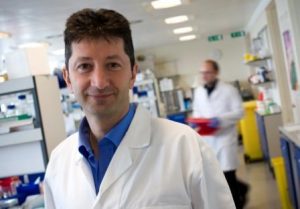ALS Researcher at Kings College London Chosen to Receive $50,000 Sheila Essey Award

Ammar Al-Chalabi, a professor of Neurology and Complex Disease Genetics at King’s College London, was presented with the Sheila Essey Award at a special session of the recent American Academy of Neurology (AAN) Annual Meeting dedicated to amyotrophic lateral sclerosis (ALS) research. He was selected to receive the $50,000 award by both the ALS Association and the AAN.
Dr. Al-Chalabi is co-discoverer of the genetic linkage between ALS and frontotemporal dementia, a finding that led to the discovery of the C9orf72 gene — now known to be the most common genetic cause of both diseases.
The award, given to support work by ALS researchers, was presented by Richard Essey, the husband of Sheila Essey, an ALS patient for died in 2004 after a 10-year struggle with the disease.
“Dr. Al-Chalabi is a brilliant clinical scientist and a world leader in the complex genetic of ALS,” Essey said in the presentation, according to a press release.
“Much of what we thought we knew about ALS in 1994, when I began my career in ALS, we now know is wrong,” Dr. Al-Chalabi said in his acceptance speech. “In particular, ALS was then thought to be one disease, but it is now clear that it is actually multiple diseases with similar clinical features ultimately initiated by different causes.”
He noted that the number of known ALS genes is doubling every four years, with seven to eight new genes discovered annually, both as a result of better technology and more extensive collaboration among genetic researchers. Such collaborations increase the sample size and allow the discovery of less common genes. And, he added, given the many large-scale genomic sequencing projects underway, “the real problem will be the analysis; [the volume of data] makes even the best information technology systems creak under the strain.”
Dr. Al-Chalabi predicted that future gene discoveries in ALS will most likely be related to genes that have modest individual effects, but combine with other genes or environmental factors to cause disease. “Sporadic ALS may be caused by many different, rare gene variants,” he said, and noted that ‘sporadic’ can no longer be equal to ‘non-genetic,’ as more and more genes are being discovered in people without a decipherable ALS family history.
The researcher also believes that certain difficult-to-explain ALS features might become understandable if the disease is seen as the result of a sequential occurrence of multiple ‘hits’ or contributing events. These events can include an inherited gene, exposure to an environmental toxin, and increased age, and Dr. Al-Chalabi has developed a mathematical model — based on European ALS studies — suggesting that six ‘hits’ are needed to cause the disease. The model helps to explain what is called incomplete penetrance, or the fact that not everyone who inherits a gene develops the disease.
“ALS genetics is advancing rapidly,” Dr. Al-Chalabi concluded. “Understanding this will allow us to develop new therapies tailored to the individual genes.”







